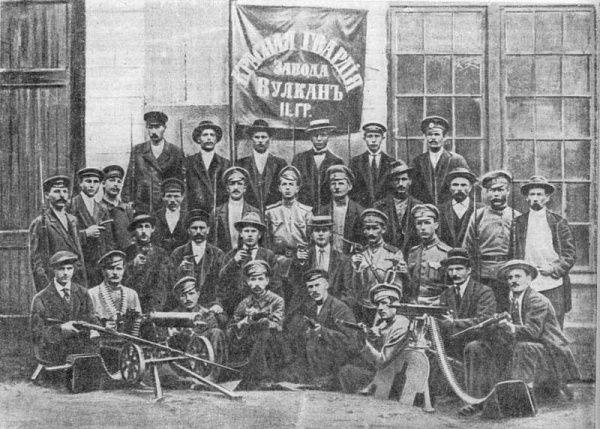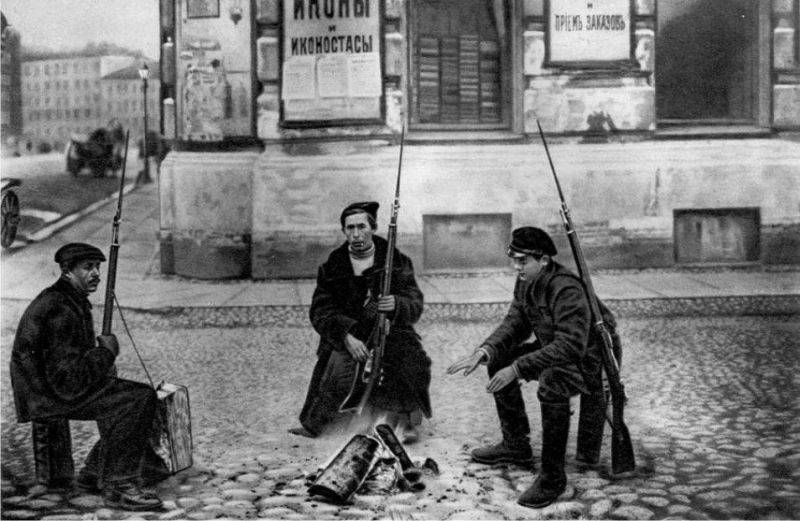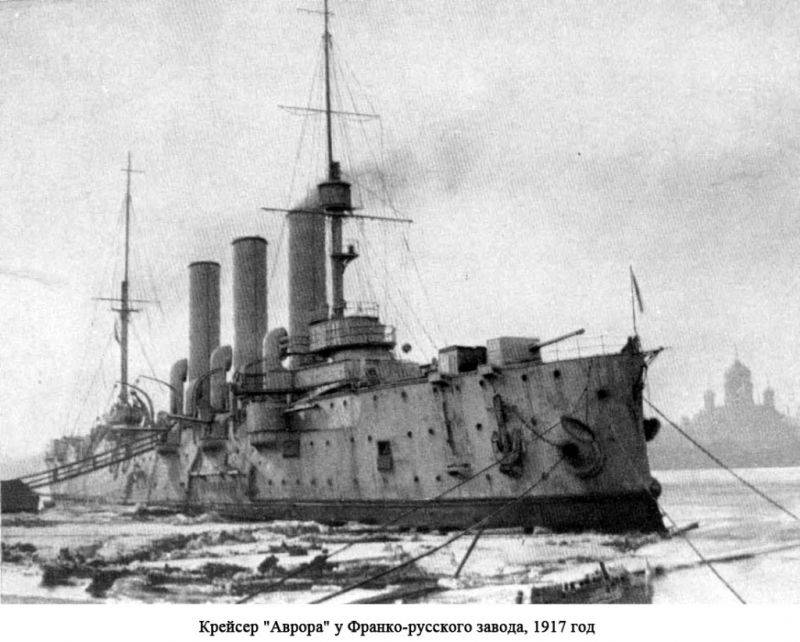"Peace" Bolsheviks
The clearest example is the conflict around the position of Grigori Zinoviev and Lev Kamenev, which they occupied in October 1917. Then they opposed the resolution of Vladimir Lenin on the armed uprising and even reported on the upcoming event in the Menshevik newspaper Novaya Zhizn. Lenin reacted to this very harshly, declaring “betrayal.” There was even a question of excluding the "traitors", but everything was limited to the prohibition to make official statements. This “October episode” (as Lenin described it in his “Political Testament”) is well known. A little less aware of the disagreements on the eve of the coup itself.
The Military Revolutionary Committee (WRC), formed by the Bolsheviks and the Left Social Revolutionaries, carried out an enormous amount of work (in particular, took control of the Petrograd garrison), creating the basis for the final seizure of power. But the Central Committee was not in a hurry to carry it out. A kind of “wait-and-see” approach prevailed there. This situation, Joseph Stalin described October 24 as follows:
“Within the WRC, there are two currents: 1) immediate uprising, 2) to concentrate forces first. The Central Committee of the RSDLP (b) joined 2. ”
The party leadership was inclined to think that it was necessary to first convene a congress of Soviets and put strong pressure on its delegates in order to replace the Provisional Government with a new, revolutionary one. However, the “temporary” were supposed to be overthrown only after the decision of the congress. Then, according to Leon Trotsky, the question of the uprising will turn from “political” into purely “policeman”.
Lenin was categorically against such tactics. He himself was outside Smolny, where he was not allowed. It seems that the leadership did not want the presence of Lenin at the headquarters of the uprising, because he was against the tactics he had chosen. October 24 Lenin several times sent letters to Smolny demanding to put him there. And each time he received a refusal. In the end, he lost his temper, exclaiming: “I do not understand them. What are they afraid of? ”
Then Lenin decided to act "over the head" of the Central Committee and turn directly to the grassroots organizations. He wrote a brief but energetic appeal to the members of the Petrograd Committee of the RSDLP (b). It began like this: “Comrades! I write these lines in the evening of 24, the situation is extremely critical. It is clearer that now, truly, the delay in the uprising is like death. With all my strength I persuade my comrades that now everything hangs in the balance, that issues that are not solved by meetings are decided next, not by congresses (even if by congresses of Soviets), but exclusively by peoples, the masses, the struggle of the armed masses ”. (By the way, while discussing the issue of Brest peace, Lenin, remaining in the minority, threatened the Central Committee that he would turn directly to the party masses. And, obviously, then many remembered his appeal to the PK.)

Then Lenin, with a wave of his hand to ban the Central Committee, went to Smolny, wearing a wig and tying up a tooth bandage. His appearance immediately changed the balance of power. Well, the support of the Petrograd Committee decided the whole thing. VRK launched an offensive, while the uprising itself entered a crucial phase. Why did Ilyich be in such a hurry, speaking out against the "flexible", "legitimist" plan of his associates?
“From 21 to 23 in October, Lenin watched with satisfaction the success of the Revolutionary Command Committee in the fight against the Petrograd military district for control of the garrison of the capital,” writes the historian Alexander Rabinovich. “However, unlike Trotsky, he viewed these victories not as a gradual process of undermining the power of the Provisional Government, which, if successful, could lead to a relatively painless transfer of power to the Soviets at the Congress of Soviets, but only as a prelude to a popular armed uprising. And each new day only confirmed his previous conviction that the best opportunity to create a government under the leadership of the Bolsheviks would be the immediate seizure of power by force; he believed that waiting for the opening of the congress would simply provide more time for preparing the forces and fraught with the threat of creating a hesitant congress at best in a conciliatory socialist coalition government "(" Bolsheviks take power: the 1917 Revolution in Petrograd ").
Indeed, Lenin doubted the courage and radicalism of the majority of delegates. They might be scared to decide on the removal of the Provisional Government. As befits a real politician, Lenin was a good psychologist and understood the most important thing perfectly. It’s one thing when you are asked to get involved in the struggle for power, and it’s quite another when you bring it “on a silver platter”.
There was also no particular radicalism among the masses, the support of which might be required at the time of the congress and when it decided to remove the Provisional Government. On October 15, a meeting of the Petrograd Committee was held, at which the Bolshevik leadership was expecting an unpleasant surprise. In total, 19 representatives of district organizations spoke. Of these, only 8 reported on the fighting mood of the masses. At the same time, 6 representatives noted the apathy of the masses, and 5 simply stated that people are not ready to speak. Of course, the functionaries took action to mobilize the masses, but it is clear that in a week a radical change was impossible. This is confirmed by the fact that October 24 "was not organized a single mass demonstration, as was the case in February and July, which was considered to be the signal for the beginning of the last battle between leftist forces and the government" ("Bolsheviks come to power") .
If the Congress of Soviets gave up the slack, if endless debates and the search for compromises began, then the radical anti-Bolshevik elements could perk up and become more active. And they had enough strength. At that time, the 1, 4 and 14 Don regiments, as well as the 6 Cossack artillery battery, were in Petrograd at that time. (We should not forget about the 3-m cavalry corps of General Peter Krasnov, who was near Petrograd.) There is evidence that on October XOXX the Cossacks were preparing a large-scale military-political action. Then the Cossack procession was planned, timed to the 22 anniversary of the liberation of Moscow from Napoleon. And to make it the Cossacks thought, as always, with weapons. It is significant that the route to the Kazan Cathedral ran through the Liteiny Bridge, the Vyborg side and Vasilyevsky Island. Cossacks walked past the train stations, the telegraph, the telephone station and the post office. Moreover, the route passed by Smolny. Note that a different route was originally planned.
The authorities banned the Cossack move, apparently fearing that the right-wing forces would become more active. (Kerensky and Co. talked about the “right of Bolshevism.”) And this prohibition caused Lenin's joy: “The cancellation of the demonstration of the Cossacks is a gigantic victory! Hooray! Go out of our way and we will win quite a few days. ” October 25 Cossacks refused to support the "temporary" at the crucial moment, when they learned that the infantry units did not support the government. But after all, they could also change their decision if the Congress of Soviets were engaged in a meaningless talking shop.
Lenin magnificently calculated all the risks and nevertheless insisted that the armed uprising should take place just before the congress. This expressed his iron political will. And the leadership of the Bolsheviks showed the ability to compromise their ambitions and find a way out of acute conflict situations. In this way it compares favorably with other party leaderships.
As noted above, Lenin did not rush Russia at all with the implementation of socialist transformations. Historian Anatoly Butenko asked about this quite reasonable question: “Why, immediately after the April party conferences, Lenin declares that he does not stand for the immediate escalation of the ongoing bourgeois revolution into a socialist one? Why he answers to such an accusation of L. Kamenev: “This is not true. I not only do not count on the immediate degeneration of our revolution into a socialist revolution, but directly warn against it, I directly state in the thesis No. 8: “Not the“ introduction ”of socialism as our immediate task, but the transition immediately (!) To control the DDS (Council of Workers) Deputies. - A.E.) for social production and distribution of products "(" Truth and lie about the revolutions of the year 1917 ").
Commenting on the October victory, Lenin says nothing about the socialist revolution, although this is often attributed to him. In fact, it was said this way: "The workers 'and peasants' revolution, the necessity of which the Bolsheviks kept talking about all the time, was accomplished." Or another quote: “The party of the proletariat in no way can set itself the aim of introducing socialism in the country of the“ small ”peasantry” (“The tasks of the proletariat in our revolution”).
So the socialist reorganization was not at all put Lenin on the agenda. And structural changes in industry began with the democratization of production, with the introduction of workers' control (this was on the question of the original authoritarianism of the Bolsheviks and the torn democratic alternatives). On November 14, the All-Russian Central Executive Committee and the Council of People's Commissars approved the “Provision on workers' control”, according to which factory and factory committees received the right to intervene in the administrative and administrative activities of the administration. The factory committees were allowed to seek the provision of their enterprises with cash, orders, raw materials and fuel. In addition, they participated in the hiring and firing of workers. In 1918, worker control was introduced into 31 provinces - in 87,4% of enterprises with more than 200 employees. Tellingly, the situation stipulated the rights of entrepreneurs.
The policy of the Bolsheviks met fierce criticism from both right and left. The anarchists were especially zealous. For example, the Voice of Labor anarcho-syndicalist newspaper wrote in November 1917:
"... Since we definitely see that there can be no talk of an agreement with the bourgeoisie, that the bourgeoisie will not go to workers' control," therefore, one must understand and say to oneself definitely also: not the control over the production of the owner's factories, but the direct the transition of factories, factories, mines, mines, all instruments of production and all means of communication and movement into the hands of the working people. " Anarchists characterized the control exercised by the Bolsheviks as "workers' and state control" and considered it a "belated measure" and unnecessary. Say, "in order to control, you need to have something to control." Anarchists suggested first “socializing” enterprises and then introducing “social labor control”.
It must be said that many workers supported the idea of immediate socialization, and in practical terms. “The most famous is the fact of socialization of the Cheremkhovsky mines in Siberia,” reports O. Ignatieva. - Anarcho-syndicalist resolutions were adopted by the congress of food industry workers and bakers in Moscow in 1918. At the end of November 1917 in Petrograd, the idea of dividing the enterprise found support from a significant part of the workers of the Red Banner factory.
Decisions on the transfer of control into the hands of the workers' union were made on a number of railways: Moscow-Windawa-Rybinsk, Perm and others. This allowed the Voice of Labor to declare in January 1918 in January that the anarcho-syndicalist method was supported by the workers . 20 January 1918 in the first issue of the Petrograd anarcho-communist newspaper “Workers 'Banner” brought new facts: Bavaria brewery, Kebka canvas factory, sawmill passed into the hands of workers (“Anarchists' views on the problems of economic reorganization of society after October revolution").
The Bolsheviks themselves were not in a hurry with socialization and nationalization. Although the latter has become an elementary state necessity. In the summer of 1917, rapid capital flight began from "democratic" Russia. Foreign industrialists were the first to give the squad a displeasure with the introduction of the 8-hour working day and the resolution of strikes. The feeling of instability, uncertainty about tomorrow also had its effect. For foreigners, and domestic entrepreneurs were drawn. Then the thoughts of nationalization began to visit the Minister of Trade and Industry of the Provisional Government Alexander Konovalov. He himself was an entrepreneur and politician of completely non-left-wing views (a member of the Central Committee of the Progressive Party). The capitalist minister considered the main reason for the need to nationalize some enterprises, the constant conflicts between workers and entrepreneurs.
The Bolsheviks carried out nationalization selectively. And in this regard is very revealing. story with the plant "AMO", which belonged to the Ryabushinsky. Even before the February Revolution, they received from the government 11 million rubles for the production of cars. However, this order was never executed, and after October, the factory owners generally fled abroad, instructing the directorate to close the plant. The Soviet government proposed the administration of 5 million, in order for the enterprise to continue functioning. She refused, and that was when the factory was nationalized.
And only in June 1918 of the year was the order of the Council of People's Commissars “On the nationalization of the largest enterprises”. According to him, the state should give enterprises with a capital of 300 thousand rubles. But even here it was stipulated that the nationalized enterprises are given to the free use of the owners. They got the opportunity to finance production and have a profit.
Then, of course, a total military communist attack on private capital began, and the enterprises lost their self-government, having fallen under tight state control. Here the circumstances of the Civil War and the radicalization accompanying it have already affected. However, at first, the Bolsheviks conducted a fairly moderate policy, which again undermined the version of their original authoritarianism.


Information